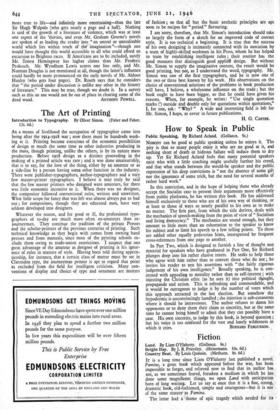How to Speak in Public
Public Speaking. By Richard Acland. (Gollancz. 5s.)
NOBODY can be good at public speaking unless he enjoys it. The pity is that so many people enjoy it who are no good at it, and nothing short of death or hideous failure will induce them to dry up. Yet Sir Richard Acland feels that many potential speakers exist who with a little coaching might usefully further his creed, and that what stands between the would-be speaker and the public expression of his deep convictions is " not the absence of some gift nor the ignorance of some trick, but the need for several months of rather hard work."
In this conviction, and in the hope of helping those who already accept the Socialist case to present their arguments more effectively from public platforms, he has written this book. He has addressed himself exclusively to those who are of his own way of thinking, or at least to those of ways so nearly parallel to his own as to make no matter. The first part, from which the title derives, deals with the mechanics of speech-making from the point of view of " Socialism and living democracy." The mechanics are sound enough, but they amount to little more than an exhortation to the speaker to know his subject and to limit his speech to a few telling points. To these are added other equally pedestrian hints, interspersed by frequent cross-references from one page to another.
In Part Two, which is designed to furnish a line of thought ana material for speakers who have graduated in Part One, Sir Richard plunges deep into his rather elusive tenets. He seeks to help those who agree with him rather than to convert those who do not ; he invites his reader to test his assertions with " the fairly rigorous judgement of his own intelligence." Broadly speaking, he is con- cerned with appealing to morality rather than to self-interest ; with injecting the Christian ethic (as he sees it) into political thpught, propaganda and action. This is refreshing and commendable, and it would be outrageous to judge it by the number of votes which this approach attracted in the last election. But somehow the hypodermic is unconvincingly handled ; the injection is sub-cutaneous
where it should be intravenous. The author refuses to damn his opponents or to deny them their claim to sincerity, but at the same time he cannot bring himelf to admit that they can possibly have a case. His own sincerity, to judge by this book, is beyond question ;
but his voice is too confused for the vast and lonely wilderness in


























 Previous page
Previous page